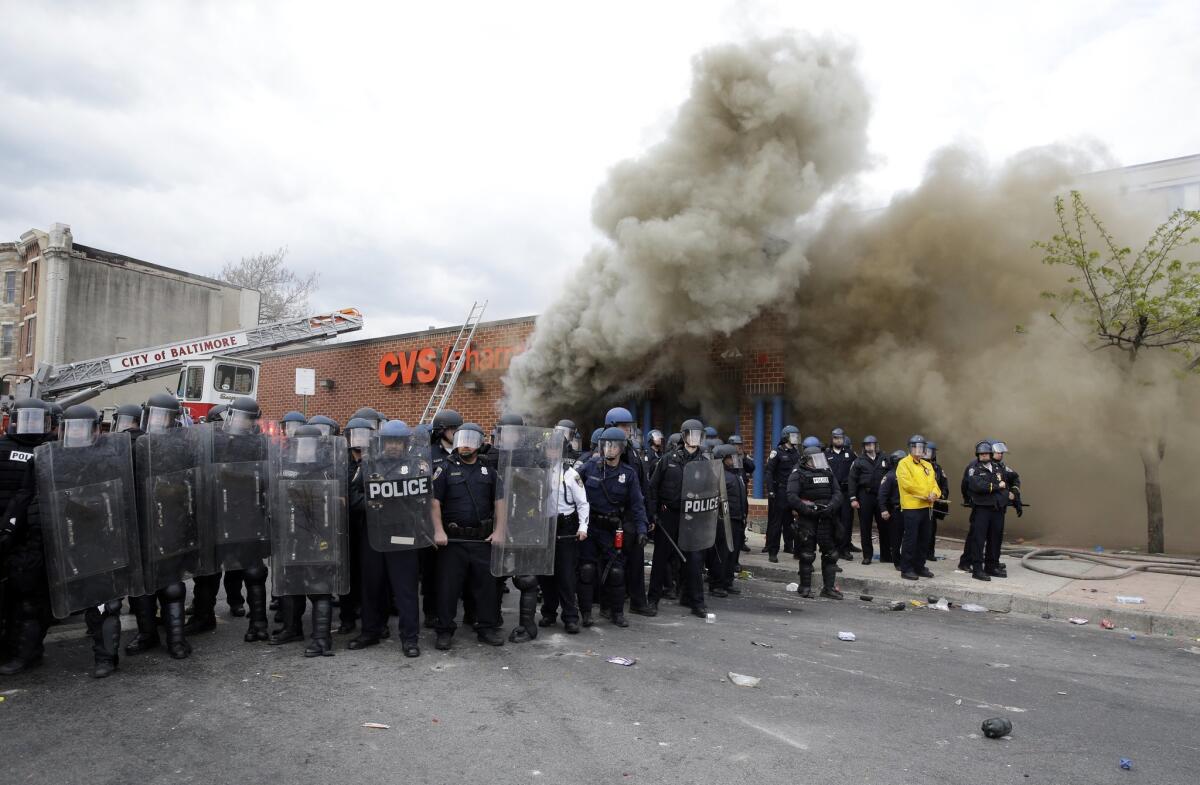U.S. opens investigation of Baltimore police, citing ‘erosion of public trust’

Police stand in front of a burning store on April 27, 2015, during unrest following the funeral of
- Share via
The Justice Department has launched a civil rights investigation of the Baltimore Police Department following the death last month of an African American man who was fatally injured while being transported by police.
U.S. Atty. Gen. Loretta Lynch said the rioting and racial turmoil that surfaced after the April 19 death of Freddie Gray, 25, and the arrest of six officers involved in the case had led to a “serious erosion of public trust.”
“We have seen the tragic loss of a young man’s life. We have seen a peaceful protest movement coalesce to express the concern of a beleaguered community,” she said. “We have seen brave officers upholding the right to peaceful protest, while also sustaining serious injury during the city’s unfortunate foray into violence. And we have watched it all through the prism of one of the most challenging issues of our time: police-community relations.”
The Justice Department’s investigation will look for unconstitutional policing practices, such as a pattern of excessive force, improper stops and illegal searches, she said.
“This process is meant to ensure that officers are being provided with the tools they need — including training, policy guidance and equipment — to be more effective, to partner with civilians, and to strengthen public safety,” Lynch said during a news conference in Washington.
The department is also conducting a separate criminal investigation of Gray’s death.
Baltimore Mayor Stephanie Rawlings-Blake had requested the Justice Department investigation.
“We all know that Baltimore continues to have a fractured relationship between the police and the community,” Rawlings-Blake said Wednesday. “I needed to look for any and all resources I could bring to my city to get this right for my community.”
Gray died a week after his spine was severed while being transported in a police van on April 12. His hands were cuffed behind his back and his legs were shackled.
Hours after his funeral on April 27, rioting erupted in Baltimore, leading to nearly a week of curfew, along with the deployment of the state’s National Guard. More than 200 people were arrested over the days of unrest and nearly 100 police officers were injured.
Prosecutors on May 1 charged six officers involved in the arrest and transport of Gray. The officers face criminal charges, including second-degree murder. All are free on bail, with the next court appearance scheduled for the end of the month.
The Baltimore prosecutor, State’s Atty. Marilyn J. Mosby, said that Gray’s arrest lacked probable cause and that a knife found on him was legal and not an illegal switchblade, as police first reported. She also said the officers denied medical attention for Gray, who was improperly secured in the van, a violation of department policy.
Federal investigators will examine records and conduct interviews to determine how the Baltimore Police Department goes about its business. It is similar to recent civil rights inquiries launched in other cities, including Ferguson, Mo., where Michael Brown, an 18-year-old unarmed black man, was shot to death by a white police officer last year.
The crisis in Baltimore comes just days into Lynch’s tenure as the first African American woman to serve as attorney general. She was sworn in April 27, replacing Eric H. Holder Jr., the first African American attorney general.
Baltimore Police Commissioner Anthony Batts welcomed any federal review.
“I think it’s a good thing,” he told WBAL-TV on Thursday after a conference of police chiefs. “We could use the extra weight. Lawsuits are down. Citizen complaints are down. Officer-involved shootings are down. But the community doesn’t feel it.”
michael.muskal@latimes.com
Twitter: @latimesmuskal
More to Read
Sign up for Essential California
The most important California stories and recommendations in your inbox every morning.
You may occasionally receive promotional content from the Los Angeles Times.













